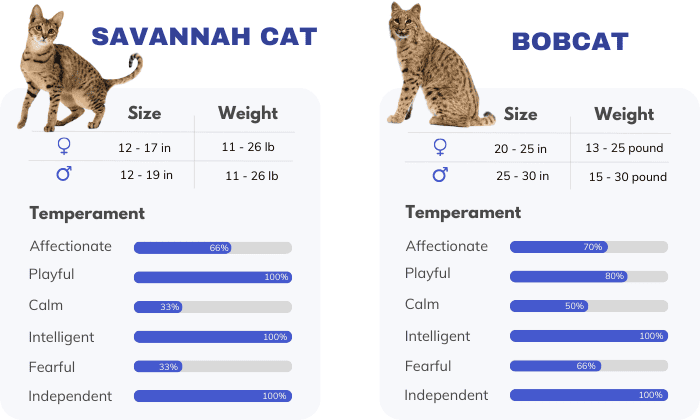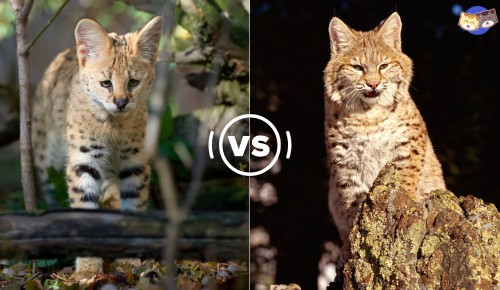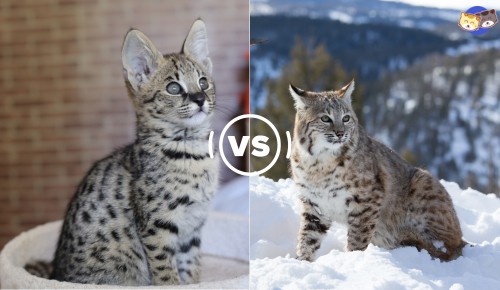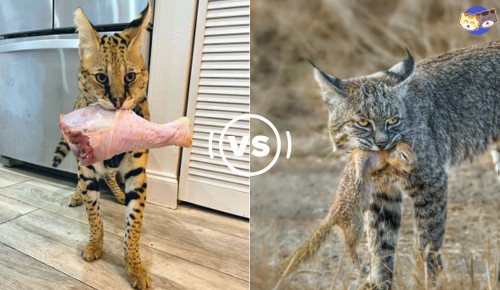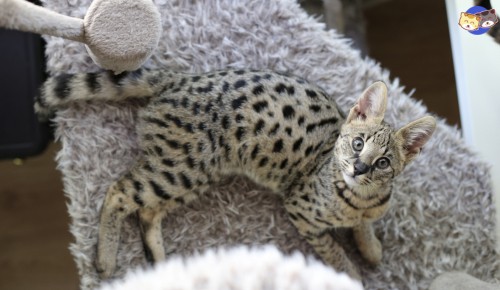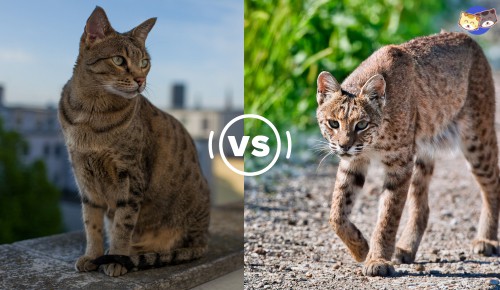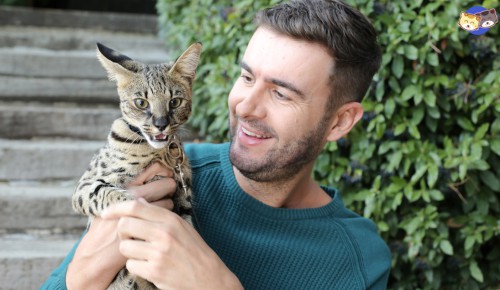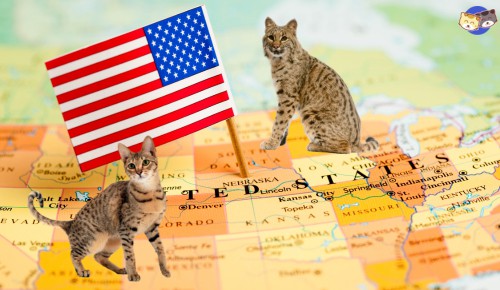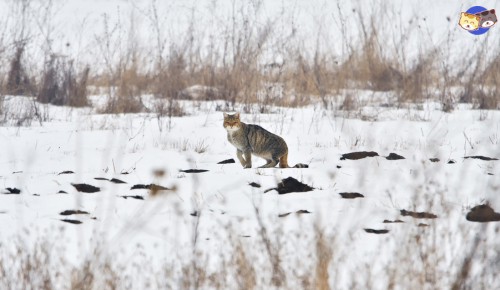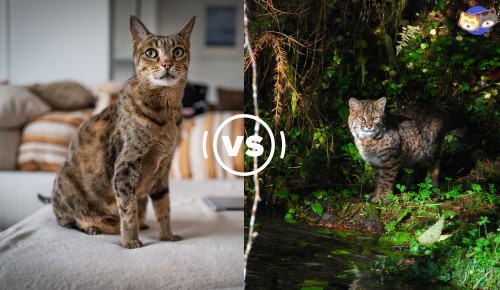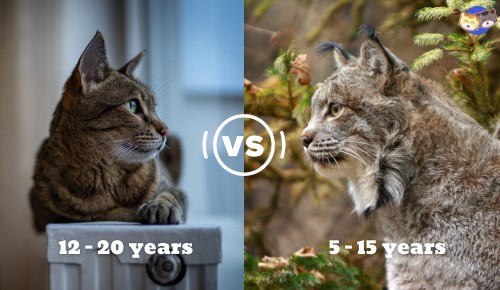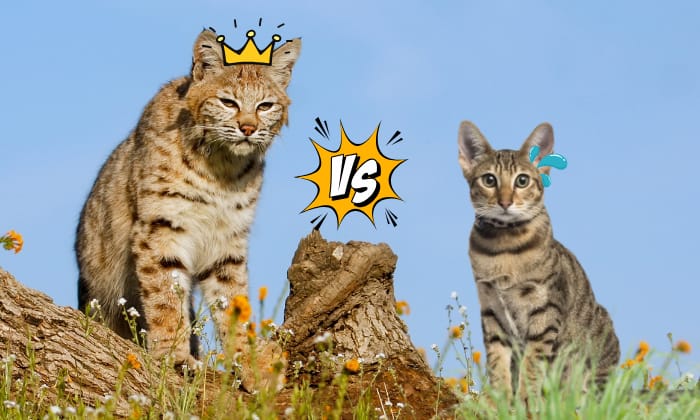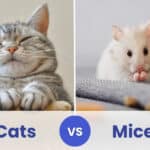Despite their shared genetic ancestry, Savannah cat vs Bobcat show notable variances. Savannah cats, a hybrid of domestic cats and servals, have a sleek, exotic appearance. Bobcats, on the other hand, are wild North American indigenous with a gruff demeanor.
In a hypothetical encounter, a bobcat’s wilderness knowledge would certainly give it an advantage, although such fights are uncommon due to diverse environments.
While these cats have a common ancestor, their differences in behavior, size comparison, and surroundings highlight the immense diversity within the feline domain.
To give you an insight, here’s a comparison table.
| Aspect | Savannah Cats | Bobcats |
| Wild Ancestry | Have wild ancestry (African Serval) | Have wild ancestry (Issoire lynx) |
| Coat Pattern | spotted coat patterns | brown or black spots/stripes |
| Diet | Wet food or meat | carnivorous diet |
| Territorial Nature | Use scent and scratches | Use scent, scratches, and scrapes for terrory-marking |
| Solitary Lifestyle | Prefer a solitary life than living in group | rare interactions with others |
| Domestication | Domesticated breed | wild animals |
| Legal Restrictions | The legality of owning varies | not legal as pets without a permit |
| Origin | Pennsylvania | North America |
| Habitat | enjoys domestic life | range of wild habitats |
| Lifespan | 12-20 years | 5-15 years in the wild, up to 18 years in domestic life |
Table of Contents
Overview
Savannah cats and bobcats are two distinct feline species with different histories and traits. Savannah cats are the offspring of a domestic cat and a serval, and they have distinctive features, a friendly demeanor, and a fondness for domestic living.
Bobcats, cats similar to Savannah cats, are native North American wild cats recognized for their untamed character, solitary habits, and tufted ears.
Savannah cats are often smaller and more adapted to domestication, while bobcats remain wild and secretive. Those interested in these intriguing felines, whether as pets or in the wild, must understand these distinctions.
Similarities Between Savannah Cats and Bobcats
Savannah cats and bobcats share numerous remarkable traits that can be traced back to their wild ancestors.
Both have compelling coat patterns reflective of their wilderness heritage, eat carnivorous food, have territorial impulses, and live mostly solitary lives, making them enigmatic and fascinating feline world members.
1. Wild ancestry
Both the Savannah cat and the bobcat have wild ancestors, with the Savannah deriving its lineage from the African Serval and the bobcat deriving its lineage from the Issoire lynx, demonstrating their intriguing links to the natural world.
2. Coat pattern
The Savannah cat and bobcat have a similarity in their attractive coat patterns. Savannah cats have distinctive spotted coats, either black or brown, that are reminiscent of their wild predecessors.
Meanwhile, bobcats have brown spots and stripes that match their natural environments and serve as good camouflage.
3. Diet
Savannah cats and bobcats both eat meat and follow a carnivorous diet, stressing the importance of meat in their diet.
These felines, whether in the wild or captivity, require meat or wet food to maintain their health and vigor.
4. Territorial nature
Savannah cats and bobcats are both highly territorial, marking their territories with scent markings. This instinctive activity allows them to communicate with other members of their species as well as set boundaries within their environments.
5. Solitary lifestyle
Savannah cats and bobcats both live mostly solitary lives, with only a few contacts with other species. These felines prefer to navigate their habitats individually, whether in the wild or domesticated, reflecting their inherent self-reliance and solitary inclinations.
Differences Between Savannah Cats and Bobcats
Savannah cats and bobcats both live mostly solitary lives, with only a few contacts with other species. These felines prefer to navigate their habitats individually, whether in the wild or domesticated, reflecting their inherent self-reliance and solitary inclinations.
1. Domestication
The domesticated state of Savannah cats and bobcats distinguishes them. Savannah cats are a domestic breed that was purposely produced for companion animals, whereas bobcats are kind of wild cats that live in their native habitats and are not susceptible to human domestication.
2. Legal restrictions
The legal limits imposed on these felines are a noticeable contrast. Savannah cat ownership varies by area and is subject to local rules and restrictions. For instance, you can have them as pets in North Carolina, Wisconsin, Alabama, and Nevada.
Meanwhile, bobcats are often forbidden as pets unless special licenses are obtained due to their wild nature and conservation issues.
3. Origin
Savannah cats can be traced back to an intentional breeding operation, primarily in Pennsylvania, where they were bred as a domestic hybrid.
Bobcats, on the other hand, are native to North America’s wildcat breeds, occurring natively in diverse sections of the continent.
4. Habitat
Their habitats are a big difference. Savannah cats flourish in domestic situations, enjoying the conveniences of indoor living. Bobcats, on the other hand, are adaptable, living in a variety of diverse settings ranging from forests to deserts to grasslands.
5. Lifespan
Savannah cats typically have longer lifetimes, ranging from 12 to 20 years when cared for in a domestic setting. Bobcats have a relatively short lifespan in the wild, ranging from 5 to 15 years, depending on environmental factors.
Who Would Win in a Battle?
In a hypothetical fight between a bobcat vs Savannah cat, the bobcat would win hands down. Bobcats are fearsome, agile, and well-adapted predators that have been tuned by evolution for survival in the wild. Their physical characteristics, such as sharp claws, powerful jaws, and a natural hunting instinct, make them formidable opponents.
Savannah cats, on the other hand, despite their remarkable look and, domestication and strong hunting instinct, lack the armament required to contend with a wild bobcat. Attempting such a confrontation would be both foolish and unethical, as it would jeopardize the well-being of the domestic Savannah cat.
Conclusion
In conclusion, while Savannah cats and Bobcats have some similarities, they are essentially different creatures with sound features and responsibilities in the natural environment. Savannah cats, the offspring of domestic cats and servals, provide friendship and charm in the home.
Bobcats are untamed and endemic to North America, and they embody the essence of wild predators, which are essential for ecological equilibrium.
These distinctions extend to their legal status, origins, habitats, lifespans, and levels of domestication, emphasizing the significance of recognizing and respecting the individual natures of Savannah cat vs Bobcat.

I am Amy Sawy, a Doctor of Veterinary Medicine (DVM) graduate from the University of Kansas. y husband, Dr. Plummer, and I own a veterinary clinic in Phillipsburg, Kansas. In addition to my professional background, I am a devoted pet owner myself, with a household that includes dogs, rodents, and most notably, cats – a total of five felines in my home.
In 2020, I joined an organization as a professional writer, leveraging my experience and collaborating with my team to deliver the most valuable information for your cat’s care.



